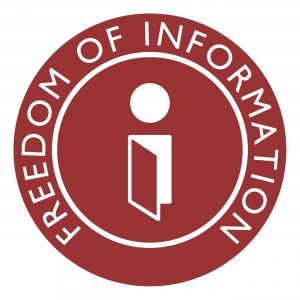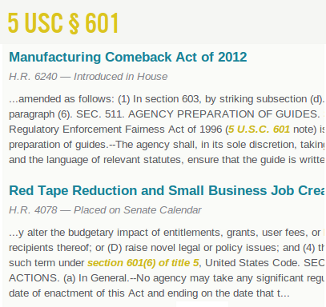At my organization, the Sunlight Foundation, we follow the rules. I don’t just mean that we obey the law — we literally track the law from inception to enactment to enforcement. After all, we are a non-partisan advocacy group dedicated to increasing government transparency, so we have to do this if we mean to serve one of our main functions: creating and guarding good laws, and stopping or amending bad ones.
 One of the laws we work to protect is the Freedom of Information Act. Last year, after a Supreme Court ruling provided Congress with motivation to broaden the FOIA’s exemption clauses, we wanted to catch any attempts to do this as soon as they were made. As many reading this blog will know, one powerful way to watch for changes to existing law is to look for mentions of where that law has been codified in the United States Code. In the case of the FOIA, it’s placed at 5 U.S.C. § 552. So, what we wanted was a system that would automatically sift through the full text of all legislation, as soon as it was introduced or revised, and email us if such a citation appeared.
One of the laws we work to protect is the Freedom of Information Act. Last year, after a Supreme Court ruling provided Congress with motivation to broaden the FOIA’s exemption clauses, we wanted to catch any attempts to do this as soon as they were made. As many reading this blog will know, one powerful way to watch for changes to existing law is to look for mentions of where that law has been codified in the United States Code. In the case of the FOIA, it’s placed at 5 U.S.C. § 552. So, what we wanted was a system that would automatically sift through the full text of all legislation, as soon as it was introduced or revised, and email us if such a citation appeared.
With modern web technology, and the fact that the Government Printing Office publishes nearly every bill in Congress in XML, this was actually a fairly straightforward thing to build internally. In fact, it was so straightforward that the next question felt obvious: why not do this for more kinds of information, and make it available freely to the public?
That’s why we built Scout, our search and notification system for government action. Scout searches the bills and speeches of Congress, and every federal regulation as they’re drafted and proposed. Through the awe-tacular power of our Open States project, Scout also tracks legislation as it emerges in statehouses all over the country. It offers simple and advanced search operators, and any search can be turned into an email alert or an RSS feed. If your search turns up a bill worth following, you can subscribe to bill-specific alerts, like when a vote on it is coming up.
This has practical applications for, really, just about everyone. If you care about an issue, be it as an environmental activist, a hunting enthusiast, a high (or low) powered lawyer, or a government affairs director for a company – finding needles in the giant haystack of government is a vital function. Since launching, Scout’s been used by thousands of people from a wide variety of backgrounds, by professionals and ordinary citizens alike.
 Search and notifications are simple stuff, but simple can be powerful. Soon after Scout was operational, our original FOIA exemption alerts, keyed to mentions of 5 U.S.C. § 552, tipped us off to a proposal that any information a government passed to the Food and Drug Administration be given blanket immunity to FOIA if the passing government requested it.
Search and notifications are simple stuff, but simple can be powerful. Soon after Scout was operational, our original FOIA exemption alerts, keyed to mentions of 5 U.S.C. § 552, tipped us off to a proposal that any information a government passed to the Food and Drug Administration be given blanket immunity to FOIA if the passing government requested it.
If that sounds crazily broad, that’s because it is, and when we in turn passed this information onto the public interest groups who’d helped negotiate the legislation, they too were shocked. As is so often the case, the bill had been negotiated for 18 months behind closed doors, the provision was inserted immediately and anonymously before formal introduction, and was scheduled for a vote as soon as Senate processes would allow.
Because of Scout’s advance warning, there was just barely enough time to get the provision amended to something far narrower, through a unanimous floor vote hours before final passage. Without it, it’s entirely possible the provision would not have been noticed, much less changed.
This is the power of information; it’s why many newspapers, lobbying shops, law firms, and even government offices themselves pay good money for services like this. We believe everyone should have access to basic political intelligence, and are proud to offer something for free that levels the playing field even a little.
Of particular interest to the readers of this blog is that, since we understand the value of searching for legal citations, we’ve gone the extra mile to make US Code citation searches extra smart. If you search on Scout for a phrase that looks like a citation, such as “section 552 of title 5”, we’ll find and highlight that citation in any form, even if it’s worded differently or referencing a subsection (such as “5 U.S.C. 552(b)(3)”). If you’re curious about how we do this, check out our open source citation extraction engine – and feel free to help make it better!
It’s worth emphasizing that all of this is possible because of publicly available government information. In 2012, our legislative branch (particularly GPO and the House Clerk) and executive branch (particularly the Federal Register) provide a wealth of foundational information, and in open, machine-readable formats. Our code for processing it and making it available in Scout is all public and open source.
Anyone reading this blog is probably familiar with how easily legal information, even when ostensibly in the public domain, can be held back from public access. The judicial branch is particularly badly afflicted by this, where access to legal documents and data is dominated by an oligopoly of pay services both official (PACER) and private-sector (Westlaw, LexisNexis).
It’s easy to argue that legal information is arcane and boring to the everyday person, and that the only people who actually understand the law work at a place with the money to buy access to it. It’s also easy to see that as it stands now, this is a self-fulfilling prophecy. If this information is worth this much money, services that gate it amplify the political privilege and advantage that money brings.
The Sunlight Foundation stands for the idea that when government information is made public, no matter how arcane, it opens the door for that information to be made accessible and compelling to a broader swathe of our democracy than any one of us imagines. We hope that through Scout, and other projects like Open States and Capitol Words, we’re demonstrating a few important reasons to believe that.
Eric Mill is a software developer and international program officer for the Sunlight Foundation. He works on a number of Sunlight’s applications and data services, including Scout and the Congress app for Android.
VoxPopuLII is edited by Judith Pratt. Editors-in-Chief are Stephanie Davidson and Christine Kirchberger, to whom queries should be directed.
[Editor’s Note: For topic-related VoxPopuLII posts please see, among others: Nick Holmes, Accessible Law; Matt Baca & Olin Parker, Collaborative, Open Democracy with LexPop; and John Sheridan, Legislation.gov.uk





